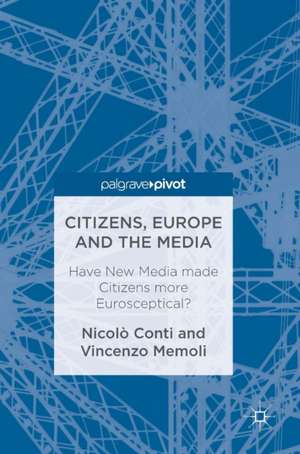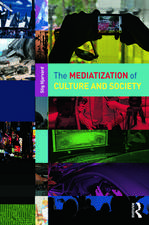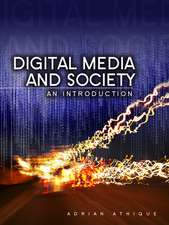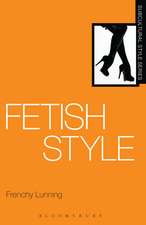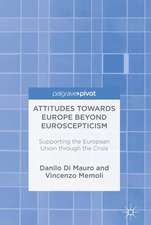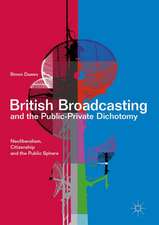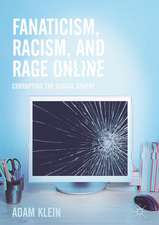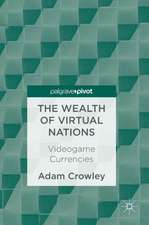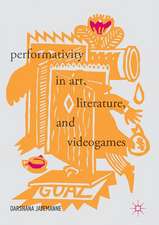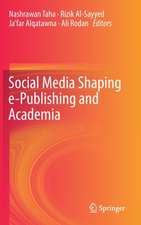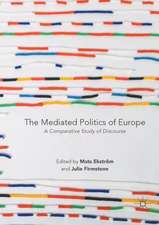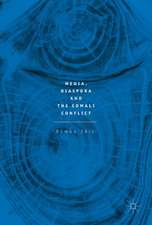Citizens, Europe and the Media: Have New Media made Citizens more Eurosceptical?
Autor Nicolò Conti, Vincenzo Memolien Limba Engleză Hardback – 15 dec 2016
| Toate formatele și edițiile | Preț | Express |
|---|---|---|
| Paperback (1) | 410.55 lei 6-8 săpt. | |
| Springer International Publishing – 4 iul 2018 | 410.55 lei 6-8 săpt. | |
| Hardback (1) | 416.54 lei 6-8 săpt. | |
| Springer International Publishing – 15 dec 2016 | 416.54 lei 6-8 săpt. |
Preț: 416.54 lei
Nou
Puncte Express: 625
Preț estimativ în valută:
79.70€ • 83.22$ • 65.97£
79.70€ • 83.22$ • 65.97£
Carte tipărită la comandă
Livrare economică 04-18 aprilie
Preluare comenzi: 021 569.72.76
Specificații
ISBN-13: 9783319452517
ISBN-10: 3319452517
Pagini: 128
Ilustrații: XI, 113 p. 9 illus.
Dimensiuni: 148 x 210 x 10 mm
Greutate: 0.3 kg
Ediția:1st ed. 2016
Editura: Springer International Publishing
Colecția Palgrave Macmillan
Locul publicării:Cham, Switzerland
ISBN-10: 3319452517
Pagini: 128
Ilustrații: XI, 113 p. 9 illus.
Dimensiuni: 148 x 210 x 10 mm
Greutate: 0.3 kg
Ediția:1st ed. 2016
Editura: Springer International Publishing
Colecția Palgrave Macmillan
Locul publicării:Cham, Switzerland
Cuprins
1. Introduction.- 2. Citizens, attitudes toward the EU, use of the media.- 3. The impact of media on citizens’ attitudes.- 4. One or many EUs?.- 5. A specific profile: Internet users.- 6. The context of opposition to and support for the EU in the member states.
Notă biografică
Nicolò Conti is Associate Professor of Political Science at the Unitelma Sapienza University of Rome, Italy. His main research focus is on parties, elites and the EU, and on coalition governance. On these topics he has published articles in several international journals. He has recently edited The Challenge of Coalition Government: The Italian Case (2015 - with F. Marangoni) and Party Attitudes Towards the EU in the Member States. Parties for Europe, Parties Against Europe (2014).
Vincenzo Memoli is Assistant Professor of Political Science at the University of Catania, Italy. His main research interests are in the fields of democracy, media, public opinion and political behaviour. On these topics he has published articles in several international journals. He is the author of Why Policy Representation Matters: The Consequences of Ideological Congruence between Citizens and their Governments (2015 – with L. Curini and W. Joe).
Textul de pe ultima copertă
'Conti and Memoli make a very compelling argument that citizens' attitudes towards the European Union are affected by their media diets and that social media may be contributing to the diffusion of Euro-skeptic views. This is a path-breaking contribution and a must-read for anyone who is interested in media effects and the future of European integration.'
- Cristian Vaccari, Royal Holloway University of London and University of Bologna
- Kenneth Benoit
This volume presents a highly comprehensive analysis of citizens’ use of media and attitudes towards the EU. It shows that the media have a definite, but differentiated, impact on citizens’ attitudes. A broad use of media positively influences support for the EU, as it refines citizens’ cognitive capabilities and understanding of the European reality. However, this work shows that prevalent use of online media serves to channel more critical attitudes and disaffection for the EU. A negative climate, particularly on the rise on the Internet and among the young and well-educated generations of active users, could influence the context where the most important political decisions on the EU are taken. In this wide-ranging text, readers will learn how this study could give a completely new perspective to EU development that, in the past, has always been about creating an ever closer union. This book will be of importance to researchers and scholars who are interested in the way that the EU’s path might be more difficult in the future if collective action through the Internet becomes a major challenge. Nicolò Conti is Associate Professor of Political Science at the Unitelma Sapienza University of Rome, Italy. His main research focus is on parties, elites and the EU, and on coalition governance. On these topics he has published articles in several international journals. He has recently edited The Challenge of Coalition Government: The Italian Case (2015 - with F. Marangoni) and Party Attitudes Towards the EU in the Member States. Parties for Europe, Parties Against Europe (2014).
Vincenzo Memoli is Assistant Professor of Political Science at the University of Catania, Italy. His main research interests are in the fields of democracy, media, public opinion and political behaviour. On these topics he has published articles in several international journals. He is the author of Why Policy Representation Matters: The Consequences of Ideological Congruence between Citizens and their Governments (2015 – with L. Curini and W. Joe).
Caracteristici
Comprehensive account of how different media influence citizens’ attitudes towards the EU Focuses on the ex-post effects of media on consumers Incorporates up to the minute data that is keenly awaited by the academic community
